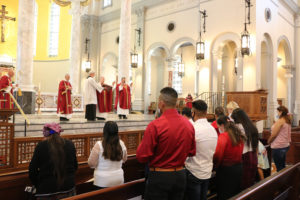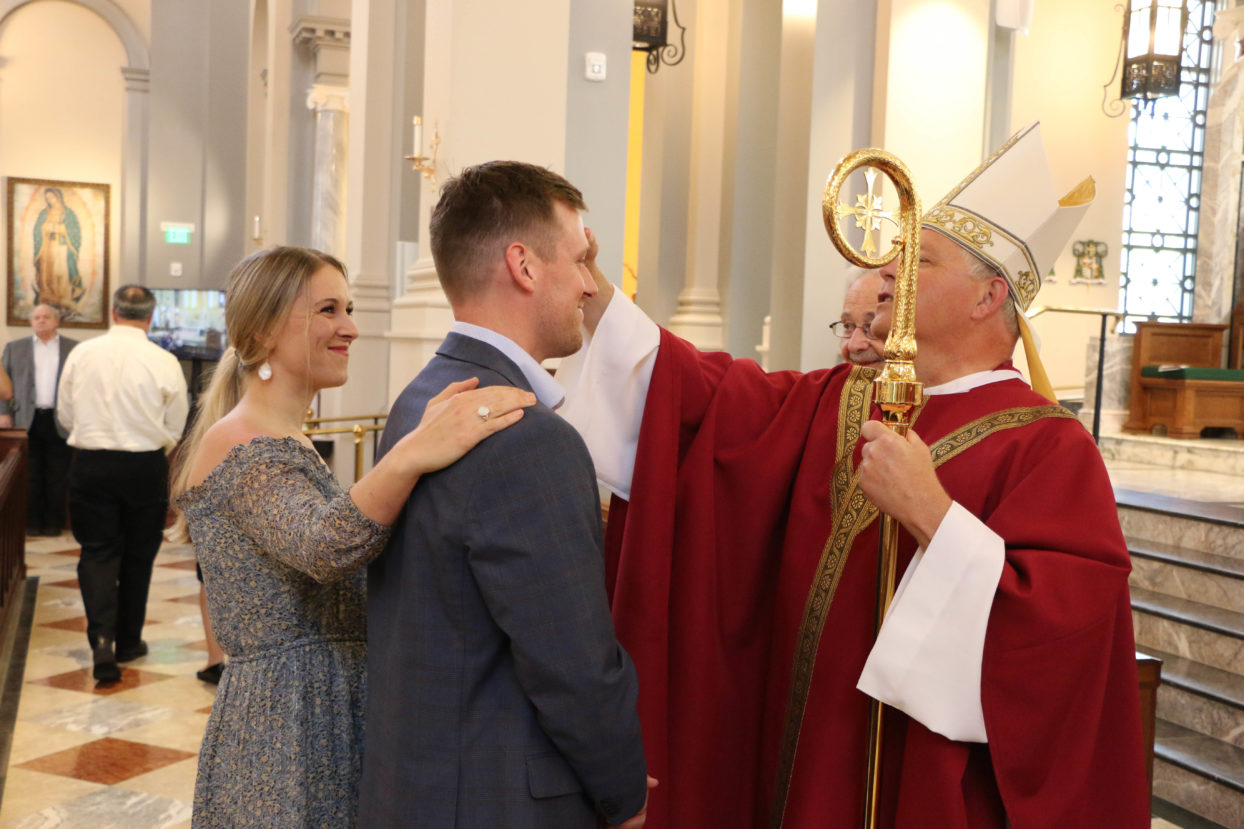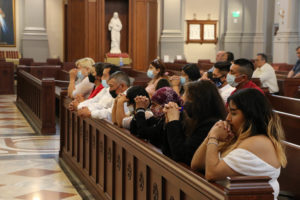Regional accents can highlight distinctions, but communicating with affection brings everyone together
By Bill Brewer
Older confirmands were again front and center in the Cathedral of the Most Sacred Heart of Jesus on Pentecost Sunday after a year hiatus due to COVID-19 as Bishop Richard F. Stika welcomed the adults who were receiving the sacrament of confirmation.
While it was a smaller group than usual, the 15 women and men who were confirmed May 23 were the continuation of a ministry important to Bishop Stika to make sure as many people as possible have access to all the sacraments.
Bishop Stika has said the adult confirmation Mass is among his favorites to celebrate.
“We gather together to celebrate the sacrament of confirmation from different places, different areas of the diocese. This is a reminder that we are one Church, one Church throughout the world. And that’s what we celebrate: the beginnings of the Church. I want to welcome you as we celebrate the completion of the sacraments of initiation,” the bishop said in opening remarks.
Father Richard Armstrong, assistant director of the Diocese of Knoxville Office of Christian Formation, presented the adult confirmands to Bishop Stika. Father Armstrong also is parochial administrator of St. Joseph Parish in Norris and St. Therese Parish in Clinton as well as pastor of St. Thomas the Apostle Eastern Catholic Mission in Knoxville.
“We usually have 50 or more candidates for adult confirmation each year. Since Bishop Stika has given the faculty to confirm in the parishes, many have chosen to receive confirmation in their home parish from their pastor. I suspect we had even more adult confirmations this year overall,” Father Armstrong said.
Father Armstrong said Bishop Stika wanted to give those who wanted to come to the cathedral the opportunity to receive the sacrament in the diocesan mother church. He noted that Bishop Stika also used the opportunity to welcome those from outside the cathedral and tell them about the cathedral’s uniqueness.
“Many adult Catholics, unfortunately, have the experience of having missed confirmation as a youth. This Mass gives them the opportunity to complete their initiation into the Catholic faith and receive the fullness of the Holy Spirit. For these men and women, this was their personal Pentecost. They have now received the fullness of grace to live out the Christian faith,” Father Armstrong said. “I’m very encouraged that Catholics, through their own initiative, are seeking to become more committed disciples of Jesus Christ. The Holy Spirit is working in and through these men and women.”
Confirmation, a sacrament instituted by Christ and different from baptism, is administered by laying-on of hands and anointing with chrism accompanied by prayer. The chrism is blessed by the bishop, and the bishop administers the sacrament. All baptized people can and should be confirmed. The effect of the sacrament of confirmation is to give strength in faith and for the confession of faith.
The adult confirmation Mass, which Bishop Stika has celebrated annually, was put on hold in 2020 amid the pandemic as social-distancing requirements took precedent. The bishop extended to parish pastors the authority to administer the sacrament.
In his Pentecost homily, Bishop Stika described to the confirmands how accents impact everyone, including him when he moved to East Tennessee from St. Louis in 2009. He lightheartedly described the different inflections from the Midwest, to the South, to the widely known cadences of New York and New Jersey.
While regional accents may high light our differences, Bishop Stika told the confirmands that God has given a single language that unites everyone: the language of love.
“I was thinking about accents as I was looking at the Gospels for the readings for the celebration of Pentecost. Accents. We all have them. Sometimes we think we don’t, but we do. You know, when the Apostles gathered in the room and they were frightened. They didn’t know if the next time somebody knocked on their door it was going to be representatives of the Jewish Sanhedrin, the powers of the Jewish community, or the Romans, who enjoyed crucifying people they didn’t like,” the bishop said.
“You have all of these emotions of the Apostles. And then they’re gathered in this room. They’ve already witnessed the ascension of Jesus returning to the Father. They were thrilled, and then all the sudden there was a gust of wind and tongues of fire. Now, I don’t know if you’re going to see tongues of fire over your head. And then the Apostles went out preaching in all these different languages that people could understand.
“Let’s look at this whole idea of languages. Now, just because I can, let’s say, speak Spanish, that doesn’t mean you’re going to understand it. You have to be able to speak the language. The other thing is you have to be able to hear the language. Sure, the Apostles are speaking all these different languages. But, you know, there is one language that brings us all together. We call it the language of love. There’s compassion, understanding, and kindness. It all comes together. How often do we hear that in our lives? On a daily basis, we may see that someone cares for us, understands us, or someone who doesn’t ignore us. In some ways it’s like a marriage. We’re sending a message. But on the other end you have to be open to what they’re saying. You can’t put earplugs in your ears or ignore them,” the bishop added.
He explained that the key is the subtle but important difference between listening and hearing.
“God speaks to us all the time. Sometimes we don’t know what to say. Other times we may say, ‘I don’t hear you.’ Or, ‘I don’t understand.’ It’s kind of a mystical thing. But it’s the power of the Holy Spirit. You know what I often think is proof of the existence of the Holy Spirit? Because of that small group in the room, the whole empire of Rome fell. The world changed, but the Church has survived. The Middle Ages, the Dark Ages, and all the plagues and persecutions that happened, the Church survived,” Bishop Stika said.
He encouraged the confirmands to be open to listening to and hearing Jesus, and to do what Jesus would do.
After his homily, the bishop explained to the confirmands the confirmation rite, how they would renew their baptismal promises before receiving the gift of the Holy Spirit.

Adult confirmands take part in the Rite of Confirmation on May 23 at the Cathedral of the Most Sacred Heart of Jesus as Bishop Stika says a prayer that is part of the rite.
“Do you reject Satan and all his works and all his empty promises? Do you believe in God the Father almighty, creator of heaven and earth? Do you believe in Jesus Christ, His only Son, our Lord, who was born of the Virgin Mary, was crucified, died, and was buried, rose from the dead, and is now seated at the right hand of the Father? Do you believe in the Holy Spirit, the Lord, the giver of life, who came upon the Apostles at Pentecost and today is given to you sacramentally in confirmation? Do you believe in the holy Catholic Church, the communion of saints, the forgiveness of sins, the resurrection of the body, and life everlasting?” the bishop asked them.
“My friends, this is our faith. This is the faith of the Church. And we are proud to profess through Christ Jesus our Lord. Amen,” he said.
Bishop Stika then chanted an ancient prayer to the confirmands invoking the Holy Spirit:
“My dear friends, through baptism God our Father gave us new birth of eternal life to His chosen sons and daughters. Let us pray to our Father that he will pour out the Holy Spirit to strengthen His sons and daughters with His gifts and anoint them to be more like Christ, who is the Son of God.
“All-powerful God, Father of our Lord Jesus Christ, by water and the Holy Spirit you freed your sons and daughters from sin and gave them new life. Send your Holy Spirit upon them to be their helper and guide. Give them the spirit of wisdom and understanding, the spirit of right judgment and courage, the spirit of knowledge and reverence. Fill them with the spirit of wonder and awe in your presence. We ask this through Christ, our Lord. Amen.”
The confirmands then stood before Bishop Stika, accompanied by their sponsors, to be anointed with the sacred chrism as they gave their confirmation name to the bishop.
And as each confirmand gave their saintly confirmation name, their sponsors placed their hands on the confirmands’ shoulders.
Bishop Stika then proceeded to make the sign of the cross on each confirmand’s forehead as he said to each, “Be sealed with the Holy Spirit,” to which the confirmands responded, “Amen.”
At the end of Mass, Bishop Stika welcomed the confirmands and all those in attendance to the Cathedral of the Most Sacred Heart of Jesus, the mother church of the Diocese of Knoxville. The bishop gave them a brief tutorial about the cathedral.


